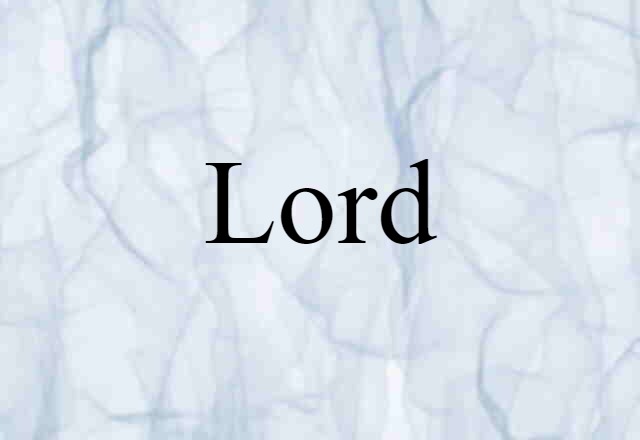- a person who has authority, control, or power over others; a master, chief, or ruler.
- a person who exercises authority from property rights; an owner of land, houses, etc.
- a person who is a leader or has great influence in a chosen profession: the great lords of banking.
- a feudal superior; the proprietor of a manor.
- a titled nobleman or peer; a person whose ordinary appellation contains by courtesy the title Lord or some higher title.
- the Lords Spiritual and Lords Temporal comprising the House of Lords
- Lord, (in Britain)
- the title of certain high officials (used with some other title, name, or the like): Lord Mayor of London.
- the formally polite title of a bishop: Lord Bishop of Durham.
- the title informally substituted for Marquis, Earl, Viscount, etc., as in the use of Lord Kitchener for Earl Kitchener.
- the Supreme Being; God.
- the Savior, Jesus Christ.
- a planet having dominating influence.
- (used in exclamatory phrases to express surprise, elation, etc.): Lord, what a beautiful day!
- to assume airs of importance and authority; behave arrogantly or dictatorially; domineer: to lord it over the menial workers.
- a person who has power or authority over others, such as a monarch or master
- a male member of the nobility, esp in Britain
- (in medieval Europe) a feudal superior, esp the master of a manor
- a husband considered as head of the household (archaic except in the facetious phrase lord and master)
- a planet having a dominating influence
- a respectful form of address used to a judge, bishop, or nobleman
- to make a lord of (a person)
- to act in a superior manner towards (esp in the phrase lord it over)
- a title given to God or Jesus Christ
- British
- a title given to men of high birth, specifically to an earl, marquess, baron, or viscount
- a courtesy title given to the younger sons of a duke or marquess
- the ceremonial title of certain high officials or of a bishop or archbishop
- an exclamation of dismay, surprise, etc
















